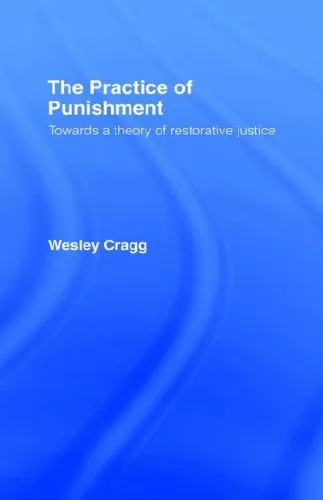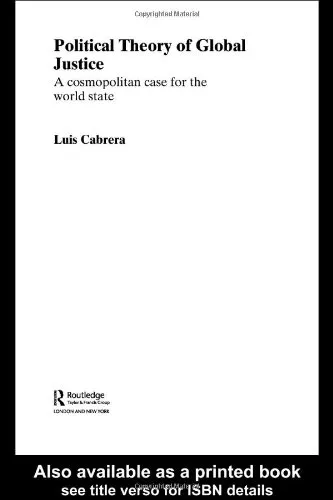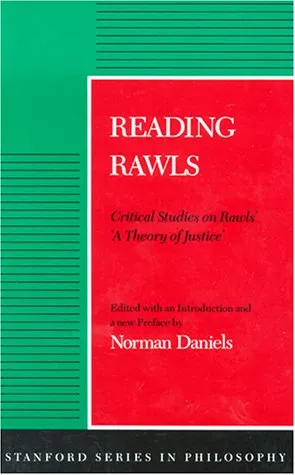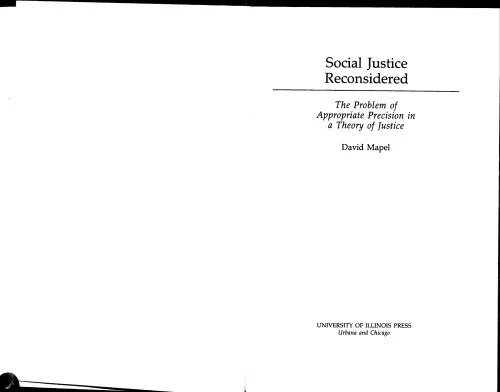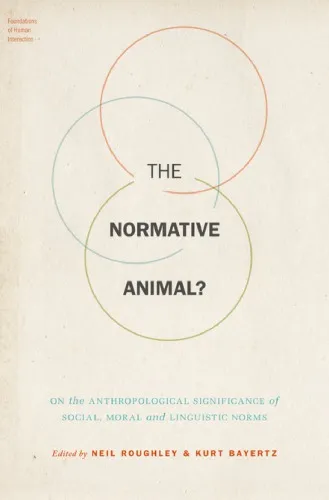The Practice of Punishment: Towards a Theory of Restorative Justice (Readings in Applied Ethics)
4.9
بر اساس نظر کاربران

شما میتونید سوالاتتون در باره کتاب رو از هوش مصنوعیش بعد از ورود بپرسید
هر دانلود یا پرسش از هوش مصنوعی 2 امتیاز لازم دارد، برای بدست آوردن امتیاز رایگان، به صفحه ی راهنمای امتیازات سر بزنید و یک سری کار ارزشمند انجام بدینکتاب های مرتبط:
معرفی کتاب "The Practice of Punishment: Towards a Theory of Restorative Justice"
کتاب "The Practice of Punishment: Towards a Theory of Restorative Justice" به قلم وسلی کراگ به بررسی نظری و عملی مفهوم مجازات و عدالت ترمیمی میپردازد. این کتاب در سری مقالات اخلاق کاربردی منتشر شده و بر فهم عمیقتری از عدالت متمرکز است که فراتر از مجازاتمحوری به سمت بازسازی و اصلاح فرد مجرم و جامعه پیش میرود.
خلاصهای از کتاب
موضوع اصلی این کتاب تحلیل انتقادی از سیستم مجازات فعلی است که در بسیاری از جوامع برای پاسخ به تخلفات و جرایم استفاده میشود. کراگ به بررسی تاریخچه، فلسفه، و اثربخشی این نظامها پرداخته و دیدگاههای متنوعی را درباره عدالت اجتماعی ارائه میدهد. او با تاکید بر Restorative Justice، مفهومی نوین از عدالت را معرفی میکند که هدف آن ترمیم روابط آسیبدیده و بازگرداندن هویت و منزلت افراد درگیر است.
نکات کلیدی
- عدالت ترمیمی به عنوان رویکردی جایگزین برای مجازاتهای سنتی معرفی میشود.
- تمرکز بر ترمیم آسیبهای وارد شده به همه افراد درگیر، نه فقط تنبیه مجرم.
- بازاندیشی در نقش و هدف سیستمهای حقوقی و قضایی در جامعه.
- تاکید بر مشارکت فعالانه تمامی اعضای جامعه در فرآیند بهبود و بازسازی.
نقل قولهای معروف از کتاب
«عدالت ترمیمی تنها به مجازات بسنده نمیکند، بلکه به دنبال بازسازی جوامع و روابط انسانی است که بر اثر جرم آسیب دیدهاند.»
«هدف از عدالت نباید تنها تنبیه باشد، بلکه باید به دنبال احیای ارزشهای انسانی و اجتماعی از دست رفته باشیم.»
چرا این کتاب مهم است؟
اهمیت "The Practice of Punishment: Towards a Theory of Restorative Justice" نه تنها در نقد و تجزیه و تحلیل سیستمهای موجود عدالت است، بلکه در ارائه جایگزینها و مدلهای نوینی است که میتوانند موثرتر و انسانیتر عمل کنند. این کتاب به خوانندگان امکان میدهد تا به مسائل عدالت و حقوق بشری با دید بازتری بنگرند و درک عمیقتری از مفهوم عدالت پیدا کنند. به خصوص در جوامعی که موضوع عدالت منتقدانه مورد بررسی قرار میگیرد، این اثر میتواند راهحلهایی نوآورانه ارائه دهد که هم به نفع جامعه و هم افراد درگیر هستند.
Introduction to "The Practice of Punishment: Towards a Theory of Restorative Justice"
Welcome to an exploration of justice reform through the lens of my work, "The Practice of Punishment: Towards a Theory of Restorative Justice." This book presents a thorough examination of the traditional punitive justice system and proposes a transformative framework through restorative justice. Delve into the nuances of accountability, repair, and community integration as alternatives to conventional punishment paradigms.
Detailed Summary of the Book
The book embarks on a critical journey, questioning the efficacy and ethical implications of conventional punishment. It contrasts traditional retributive justice with an emerging restorative justice model that emphasizes healing and rehabilitation. The core idea is that justice should not solely focus on punishing offenders but should also aim to restore the harm caused to victims and communities. The first few chapters dissect the origins and evolution of punishment philosophy, exploring its contingent socio-political frameworks. We traverse historical contexts that shaped modern legal systems, scrutinizing their shortcomings.
Midway through the book, the focus shifts to restorative justice principles, presenting concrete cases where this model has been successfully implemented. These examples highlight alternative court systems like community service boards and victim-offender mediation programs, which prioritize dialogue and constructive resolution over incarceration. The closing chapters are a call to action for policymakers, legal professionals, and civil society to consider and adopt restorative practices. Here, you’ll find a comprehensive argument for integrating these concepts into the broader legal framework, thereby laying the groundwork for a more equitable justice system.
Key Takeaways
- Restorative justice is a collaborative process that involves victims, offenders, and community members in meaningful dialogue for reconciliation.
- Traditional punishment often fails to address the root causes of crime, whereas restorative justice seeks to foster understanding and personal accountability.
- Integrating restorative practices can reduce recidivism and promote community cohesion and healing.
- Restorative justice provides a moral and ethical framework for responding to crime that is not solely punitive but rehabilitative.
Famous Quotes from the Book
"Justice is not about revenge. It's about creating an environment where healing, not hostility, is the natural outcome."
"Restorative justice is a journey of movement away from punishment to a tapestry woven of understanding and human connection."
Why This Book Matters
This book is an essential read for anyone interested in justice reform, emphasizing that punishment is not an effective deterrent for crime in isolation. As criminal justice systems worldwide are challenged to demonstrate more humane and socially constructive responses to wrongdoing, restorative justice offers a viable solution. This work provides both an academic foundation and practical guidance for stakeholders seeking to reframe justice systems. Legal practitioners, academics, policymakers, and activists will find this book a valuable resource that inspires systemic change aligned with ethical and social imperatives. By illustrating how restorative justice can be applied practically, the book serves as a beacon of hope for creating more equitable societies.
دانلود رایگان مستقیم
شما میتونید سوالاتتون در باره کتاب رو از هوش مصنوعیش بعد از ورود بپرسید
دسترسی به کتابها از طریق پلتفرمهای قانونی و کتابخانههای عمومی نه تنها از حقوق نویسندگان و ناشران حمایت میکند، بلکه به پایداری فرهنگ کتابخوانی نیز کمک میرساند. پیش از دانلود، لحظهای به بررسی این گزینهها فکر کنید.
این کتاب رو در پلتفرم های دیگه ببینید
WorldCat به شما کمک میکنه تا کتاب ها رو در کتابخانه های سراسر دنیا پیدا کنید
امتیازها، نظرات تخصصی و صحبت ها درباره کتاب را در Goodreads ببینید
کتابهای کمیاب یا دست دوم را در AbeBooks پیدا کنید و بخرید
1414
بازدید4.9
امتیاز0
نظر98%
رضایتنظرات:
4.9
بر اساس 0 نظر کاربران
Questions & Answers
Ask questions about this book or help others by answering
No questions yet. Be the first to ask!
